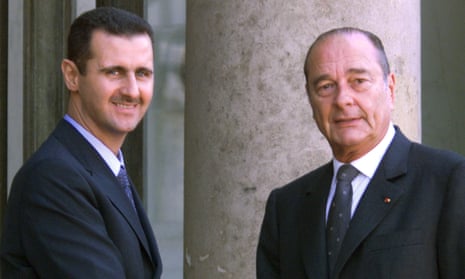The French government has begun the formal process of stripping the Syrian president, Bashar al-Assad, of his Légion d’honneur, as the French president, Emmanuel Macron, seeks to reform the country’s most prestigious but sometimes controversial award.
Less than a week after France joined the US and Britain in missile strikes against Syrian targets in response to the use of chemical weapons by the Assad regime, the Elysée palace said a “disciplinary procedure” for withdrawing the award was under way.
The decision to withdraw the honour can only be made by a French president, as the top-ranking member of the National Order of the Légion d’honneur. Assad was decorated with the great cross, the highest of the distinction’s five grades, after he took office in 2001.
Each year around 3,000 people receive the honour, created by Napoléon Bonaparte in 1802 to reward distinguished citizens and military valour, but Macron has said he aims to “return to the original spirit” of the honour by restricting the number of awards and ensuring they are based on merit.
The president’s spokesman, Christophe Castaner, had previously confirmed that no more than 2,000 distinctions would be awarded annually. Only 101 were handed out to mark Bastille Day last July, against the more customary 500-600.
The numbers of French civilians and military personnel receiving the award have been cut by 50% and 10%, while 25% fewer foreigners – honoured for “rendering service to France” through cultural or other achievements, or defending causes France particularly supports – will earn the honour.
But there is no official target for reducing the number of so-called “diplomatic” Légions d’honneur, often given to foreign dignitaries during state visits. Such distinctions, considered acts of “diplomatic reciprocity” and a useful tool of French foreign policy, are rarely reported.
Assad’s decoration, by the former president Jacques Chirac during a state visit to Paris, did not become public knowledge until eight years later when the Syrian embassy in France mentioned it to the author of a book on the award.
Chirac’s 2006 award of the great cross to the Russian president, Vladmir Putin, was discovered – to considerable public anger – at the time, but only because Russian journalists recorded the occasion on film.
Other controversial foreign dignitaries known to have been decorated with the honour include Saudi Arabia’s previous crown prince, Mohammed bin Nayef, honoured by François Hollande in 2016 despite a sharp increase in the number of death sentences handed down by Saudi courts.
Previous presidents Charles de Gaulle, François Mitterrand and Nicolas Sarkozy also decorated such unsavoury characters as the Romanian despot Nicolae Ceaușescu, the Tunisian dictator Zine El Abidine ben Ali, and the president of Gabon, Ali Bongo , whose family own an estimated €150m of assets in France.
Rules making it easier to take back the honour from foreigners were finally introduced in 2010, only after the former Panama military dictator, Manuel Noriega, decorated in 1987, was removed from power by the US two years later and extradited to France to serve 10 years in jail for money laundering.
French presidents can now strip the award from any foreigner sentenced to at least a year in prison, or who has “committed acts or behaved in such a way that could be declared dishonourable, or could damage the interests of France abroad, or causes that France supports”.
Since the change, the Hollywood mogul Harvey Weinstein has had his decoration withdrawn, following accusations of sexual harassment and rape, as have the cyclist Lance Armstrong, for using performance-enhancing drugs, and the fashion designer John Galliano after he made antisemitic slurs.
Assad has been accused of massacring tens of thousands of his own people, including in chemical attacks, during the civil war that has raged in Syria since 2011. The decision to strip him of his honour “does not mean France will not continue to work with all parties in Syria, including the regime, to find a solution” to the crisis, the Elysée said.
